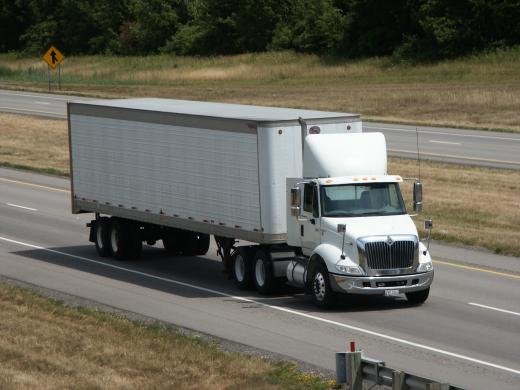Heavy Goods Vehicle (HGV) insurance is insurance designed especially to deal with issues relevant to HGVs, also known as Large Goods Vehicles (LGVs). HGVs are defined as vehicles that weigh more than four tons, and they are used to haul large goods, livestock, and pallets all over the world. HGV insurance provides coverage for these very heavy, very expensive vehicles that often carry large loads of valuables. Both HGV and LGV are terms commonly used in the United Kingdom and the European Union, while in the United States, HGVs are generally known as trucks, trailer trucks, or tractor trailers. Minimal HGV insurance is required in many areas, and more extensive coverage is recommended for all companies and drivers.
In order to drive an HGV, drivers must carry a specialized license and often follow more extensive restrictions in regards to drug and alcohol use while driving, due to the risks involved in driving a much larger vehicle than a conventional car or small truck. Because driving an HGV requires more skills and is more dangerous than driving many other vehicles, most companies offering HGV insurance demand that drivers satisfy a number of qualifications before they can be covered by HGV insurance. These qualifications generally include minimum age and driving experience, along with a clean driving record. Many carriers do not offer HGV insurance for vehicles transporting hazardous materials, and it can be difficult to find underwriting for fleets that transport explosives, chemicals, or biological hazards.

HGV insurance is similar to conventional insurance in many ways – the owner of the vehicle or fleet pays an annual or semi-annual premium in exchange for a level of coverage agreed upon by the insurer and the insured and outlined in a contract. Basic HGV insurance covers damage made by the vehicle to others, and plans scale up to cover damage to the truck or contents, theft insurance, and Goods in Transit insurance, which assures companies contracting with the freight company that their goods are protected in the event of an incident.

HGV insurance serves to protect both the vehicle owner, who has made a substantial investment, and the driver, who knows that his or her vehicle will be covered in the event of an incident or accident. Theft of HVGs in the United Kingdom is widespread, considering the size of the vehicles, with approximately ten being stolen each day on average. Theft of goods from HGVs is also common, and a concern for companies shipping large amounts of product. Finally, accidents do happen, and as in the case of conventional vehicle insurance, it is comforting to know that drivers are protected in the event of a potentially very expensive accident, whether it is the driver's fault or not.
Ever since she began contributing to the site several years ago, Mary has embraced the exciting challenge of being a About Mechanics researcher and writer. Mary has a liberal arts degree from Goddard College and spends her free time reading, cooking, and exploring the great outdoors.

